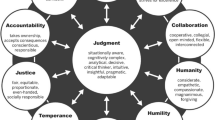Abstract
Previous research has indicated that stereotypically masculine behaviors characterize leadership and that stereotypically feminine traits are devalued. However, this research may be questioned on the basis that the sex stereotype measures employed were not appropriate for the managerial role and that the rating task was not clearly defined. The present study attempts to deal with these concerns by asking groups to rate two different managers: the one they would wish to work for or the one they would wish to have working for them. As hypothesized, those who described the supervisors who they wished to have working for them valued masculine traits significantly more than those who described the supervisor they would like to work for. In all cases, however, stereotypically sexneutral traits were most highly valued.
Similar content being viewed by others
References
Bem, S. L. The measurement of psychological androgyny. Journal of Consulting and Clinical Psychology, 1974, 42, 155–162.
Dobbins, G. H., & Platz, S. J. Sex differences in leadership: How real are they? Academy of Management Journal, 1986, 11, 118–127.
Hollander, E. P. Leadership and power. In G. Lindzey & E. Aronson, (Eds.), The handbook of social psychology, 3rd ed. New York: Random House, 1985.
Powell, G. N., & Butterfield, D. A. The “good manager”: Masculine or androgynous? Academy of Management Journal, 1979, 22, 395–403.
Powell, G. N., & Butterfield, D. A. if “good managers” are masculine, what are “bad managers”? Sex Roles, 1984, 10, 477–484.
Schein, V. E. The relationship between sex role stereotypes and requisite management characteristics. Journal of Applied Psychology, 1973, 57, 95–100.
Schein, V. E. The relationship between sex role stereotypes and requisite management characteristics among female managers. Journal of Applied Psychology, 1975, 60, 340–344.
Williams, J. E., & Bennett, S. M. The definition of sex stereotypes via the adjective checklist. Sex Roles, 1975, 1, 327–337.
Author information
Authors and Affiliations
Additional information
Reprint requests may be sent to either author at the Department of Psychology, University of North Carolina at Charlotte, Charlotte, North Carolina 28223. Preliminary data from this investigation were presented at the Southeastern Psychological Association Convention, March 1985. The authors wish to thank David Gilmore for his comments on an earlier version of the paper, and Debra Schwartz for her efforts in the data collection and analysis stages of the project.
Rights and permissions
About this article
Cite this article
Cann, A., Siegfried, W.D. Sex stereotypes and the leadership role. Sex Roles 17, 401–408 (1987). https://doi.org/10.1007/BF00288143
Issue Date:
DOI: https://doi.org/10.1007/BF00288143




